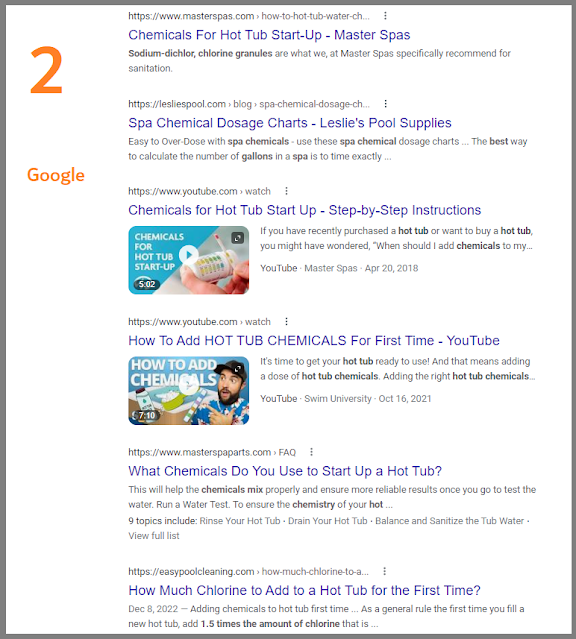Write down these numbers (or bookmark this post):
The latest available data shows that Google has about 86% of the US market share, and 92% of the global market share for search. Bing enjoys less than 8% of the US market share, and right at 8% of the global market share.
Number three in the global market is Baidu, the Chinese search engine that's dominant in China and growing in other Chinese-influenced markets. Number three in the US is, Nobody Cares because there's basically no market share to divide among Yahoo, Yandex, Baidu, and DuckDuckGo.
See https://www.oberlo.com/statistics/search-engine-market-share and https://www.oberlo.com/blog/top-search-engines-world (Or Google it youself.)
I say write down these numbers because Microsoft is betting the $13 Billion farm on their new search strategy, integrating OpenAI's "chat" artificial intelligence into their search engine. Theoretically, this will change everything. In reality, Google is one centimeter behind them and just hasn't had the mindshare fun-factor of ChatGPT. It's possible that New Improved Google +AI will keep people from switching.
I was recently "accepted" into the elite group of millions of users with access to the full new Bing search feature plus AI. There really should be a catching name for this supposed name-changer. But don't worry, Microsoft stockholders: They haven't wasted a single penny on branding, naming, or logos.
I'm going to dive into the New Improved Bing +AI (which is what I'm calling it in hopes that Microsoft adopts that name. Not like New Coke. Just different from old school Bing.)
Search Needs a New Approach!
I have tried Bing every few years and always found it wanting. The primary reason is that it was designed to sell you things, not give you information. Way back when it was new (2009), Bing hoped to diminish Google's ad dominance by helping people buy things, even when they didn't want to.
If you need proof that Bing assumes you're looking to buy something, enter a search for something you know is out there, like "managed services SOP video." It's very likely that you'll see an information box asking, "How much does managed services SOP video cost?" This will appear above videos on managed services SOPs.
Meanwhile, Google has designed their search to keep you on their site as long as possible and serve you more ads, more ads, and then some more ads. And their key differentiating factor for search (page authority) has been muddled by their own advertising. So it's better at give actual information and answers, but you have to dig through the digital detritus to find it.
Let me demonstrate. Today (February 2023), I searched for some facts: "best chemical mix for 350 gallon hot tub" on both Bing and Google.
Page One of Bing results were:
- Ad for Amazon - not actually relevant to the search term
- Ad for a chemical retailer - very relevant to the search
- A featured ad from Leslie's pool supply - also relevant
Page Two of Bing results were:
- Information window with two callouts - Related to which products to by. Not directly related to search question posed
- Information windows with videos - Again, related to chemicals but not related to the search question
- Organic link about the "best" chemicals to buy, but not relevant to the search question
Summary for Bing: Three ads; three links relevant to the search; zero direct hits on the question posed.
Page One of Google results were:
[Note: No ads. This seems odd to me, but there you go.]
- Organic link about the "best" chemicals to buy, but not relevant to the search question
- Information block will callouts for related question. Close, but not a direct hit on the question posed
- Organic link "for beginners" - Direct hit! Relevant and appears to address the question posed in the search
- Organic link - On Target! Relevant and addresses the question posed in the search
Page Two of Google results were:
- A link to a relevant chemical reseller product - "Relevant" but no information that actually addresses the search request
- The organic link to Leslie's pool supply - Again, relevant to the topic but not the search request
- YouTube video link - On Target! Relevant and addresses the question posed in the search
- YouTube video link - On Target. Relevant and addresses the question posed in the search
- Organic link to a spa store - On Target. Relevant and addresses the question posed
- Organic link to a spa store - Close, but somewhat less relevant to the question posed
Summary for Google: No ads; four links relevant to the search; five direct hits on the question posed.
This is not a scientific, random sample. And it's odd that this search did not generate Google ads on this day. BUT this is my experience! This is why I try Bing, am disappointed, and go somewhere else: I mostly search for information, not things to buy.
In my opinion, search has become less and less relevant to fact-finding missions. Clayton Christensen would not see the move to AI as a "disruption" of search, but it's certainly a welcome evolution.
So: I'm going to try to relay on the New Improved Bing +AI as much as I can. I'll keep some notes and report back on my findings. If Microsoft's reports are accurate, millions of people will be joining me. We shall see.
Stay tuned. And your feedback and comments are always welcome.
:-)


















